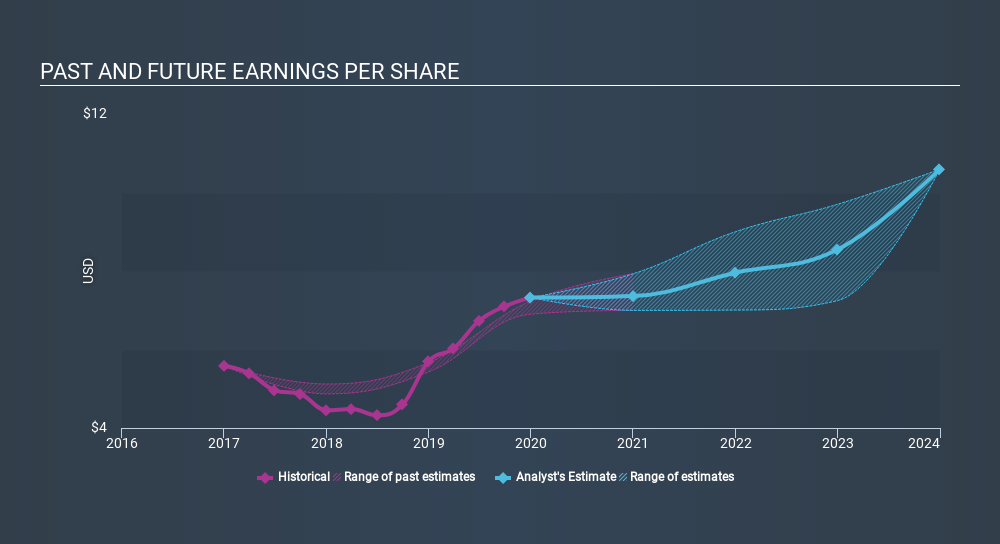- United States
- /
- Airlines
- /
- NYSE:DAL
Update: Delta Air Lines (NYSE:DAL) Stock Gained 30% In The Last Five Years
When you buy and hold a stock for the long term, you definitely want it to provide a positive return. But more than that, you probably want to see it rise more than the market average. Unfortunately for shareholders, while the Delta Air Lines, Inc. (NYSE:DAL) share price is up 30% in the last five years, that's less than the market return. Looking at the last year alone, the stock is up 15%.
See our latest analysis for Delta Air Lines
To paraphrase Benjamin Graham: Over the short term the market is a voting machine, but over the long term it's a weighing machine. One way to examine how market sentiment has changed over time is to look at the interaction between a company's share price and its earnings per share (EPS).
During five years of share price growth, Delta Air Lines achieved compound earnings per share (EPS) growth of 56% per year. The EPS growth is more impressive than the yearly share price gain of 5.4% over the same period. Therefore, it seems the market has become relatively pessimistic about the company. The reasonably low P/E ratio of 7.91 also suggests market apprehension.
The image below shows how EPS has tracked over time (if you click on the image you can see greater detail).

We know that Delta Air Lines has improved its bottom line lately, but is it going to grow revenue? Check if analysts think Delta Air Lines will grow revenue in the future.
What About Dividends?
It is important to consider the total shareholder return, as well as the share price return, for any given stock. The TSR is a return calculation that accounts for the value of cash dividends (assuming that any dividend received was reinvested) and the calculated value of any discounted capital raisings and spin-offs. So for companies that pay a generous dividend, the TSR is often a lot higher than the share price return. As it happens, Delta Air Lines's TSR for the last 5 years was 44%, which exceeds the share price return mentioned earlier. And there's no prize for guessing that the dividend payments largely explain the divergence!
A Different Perspective
Delta Air Lines shareholders gained a total return of 18% during the year. But that return falls short of the market. On the bright side, that's still a gain, and it's actually better than the average return of 7.5% over half a decade It is possible that returns will improve along with the business fundamentals. I find it very interesting to look at share price over the long term as a proxy for business performance. But to truly gain insight, we need to consider other information, too. Consider for instance, the ever-present spectre of investment risk. We've identified 4 warning signs with Delta Air Lines (at least 1 which is a bit unpleasant) , and understanding them should be part of your investment process.
If you like to buy stocks alongside management, then you might just love this free list of companies. (Hint: insiders have been buying them).
Please note, the market returns quoted in this article reflect the market weighted average returns of stocks that currently trade on US exchanges.
If you spot an error that warrants correction, please contact the editor at editorial-team@simplywallst.com. This article by Simply Wall St is general in nature. It does not constitute a recommendation to buy or sell any stock, and does not take account of your objectives, or your financial situation. Simply Wall St has no position in the stocks mentioned.
We aim to bring you long-term focused research analysis driven by fundamental data. Note that our analysis may not factor in the latest price-sensitive company announcements or qualitative material. Thank you for reading.
About NYSE:DAL
Delta Air Lines
Provides scheduled air transportation for passengers and cargo in the United States and internationally.
Very undervalued with acceptable track record.
Similar Companies
Market Insights
Community Narratives




